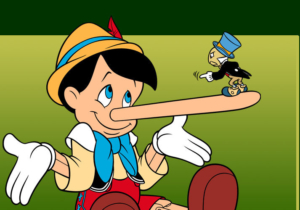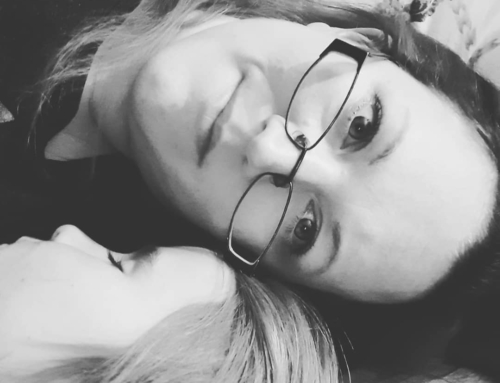There’s a new article that seems to be making the rounds, gathering shares and likes, entitled How to Tell a Great Lie as a Parent. I can first tell you that although the article is about lying to your kids and somehow trying to make positives out of it, it is not in fact a “how-to” guide, which I suppose is good, though not much of an improvement over what it actually is.
It opens with the following:
“Fibbing to your kids can sometimes be an improvement on the truth.”
Um… yes, that’s true, but fibbing to anyone can sometimes (or oftentimes?) be an improvement on the truth; isn’t that why we often lie? However, I thought the goal of the truth was to, you know, tell the truth? If we take this adage as something to live by, then it seems we’re saying we’re opting for what’s easiest not what’s best and is that the lesson we really want to teach our children?
I could stop right here and not even address the rest of the article because all we should be thinking of is being the type of person we want our children to be. Do we want them to lie to others? To take the easy way out because it’s easier or sounds nicer? No, we don’t, and so we shouldn’t be that person either. If you are, then you are becoming part of the problem.
The author discusses the idea of benefits to lies and inherent in her words is the very false notion that “telling the truth” = “sharing all details of every thought no matter how appropriate or inappropriate and saying it in a way that is inconsiderate of the person you are speaking to”. Sadly a lot of people have that impression of “telling the truth” when in fact it’s quite far from that. With this idea, though, she has given parents a list of lies we can tell our children and how they “benefit” our children. I’m going to share them and share what you might want to say instead so we can hopefully put to sleep the idea that lying is positive, or even to be encouraged.
“Well, I believe in Santa Claus.” (Feed your kids’ imaginations)
This is probably the most widely accepted lie and I’m not going to get into the debate on whether or not parent should do Santa or what is “right” or “wrong” (if there can even be a clear cut answer on that that isn’t family-specific). I think families have many reasons for what they choose. I will speak briefly on the imagination issue then get to the real issue which is when parents who have done this are faced with a very awkward question…
The author takes the very common approach of arguing that not doing Santa or the Easter Bunny or anything like that is “ruining” kids’ imaginations. To say that is to suggest that the large portion of the population that doesn’t do these holidays have children with no imagination and yet have you ever heard someone say this to a Jewish family? Or a Muslim family? Or a Buddhist family? No because they realize that simply because another family has a different religious belief or custom does not mean their children lack imagination. Children engage in imaginative play year-round, often without “characters” needing to be reinforced. So please, if you do Santa, don’t suggest that people who don’t are ruining or even inhibiting their children’s imagination. You have no idea what these families do year-round.
That said, many people have kids who believe in Santa Claus and who face the dilemma of what to say when asked directly about it, which seems to be the point of this one, and it’s a fair dilemma to find yourself in if you have done the “Santa” or “Easter Bunny” thing for many years. However, if you have a kid who asks you about Santa or what you believe, it is entirely possible to say, “What I believe – what anyone else believes – doesn’t matter. It’s what you believe that counts. So what do you believe?” Hopefully you can say this honestly as well. I would hope that parents do teach their children that what they believe matters most and that their sense of self-worth has to truly come from within (with the right kind of support from us, of course). The same goes for beliefs.
“Sorry, that bike is too expensive.” (Preserve a surprise)
The author uses the examples of toys already bought that are supposed to be a big “surprise” for kids. She even says that “it’s not really lying” to lie to preserve a surprise. Here’s the thing though: You can still preserve the surprise without lying. I’m not kidding! Instead of coming up with a lie as the excuse as to why you aren’t buying something right at that moment, why not say, “Sorry, we’re not getting that today” or “We’re not here to buy toys, we’re here to buy X, Y, or Z”?
I realize in a society where we often lie to others and come up with false reasons for things we can’t do, we have become used to expecting a reason. We almost expect people to lie to us. And we expect that our children have the same expectations, but that doesn’t mean we have to buy into it and we’re doing ourselves a disservice when we do. Thinking of the current example, if you use “Sorry, that bike is too expensive” then the child ends up with the bike, would you expect them to believe you when you tell them the item that is too expensive really is? With any excuse you use, you run the risk of it biting you in the ass later, so why not just be honest from the get-go without divulging too much information? Again, telling the truth doesn’t mean telling every detail.
“I never text and drive.” (Ensure your kids’ safety)
If it’s not something you want to tell your child you do, don’t do it. If you can’t do that, don’t lie, talk to them about why you do it, the risks you may be taking, and why you don’t want them to do it even if you do it. If you want to keep your kids safe, give them information. If you’ve done drugs and don’t want your kids doing them, tell them the details (when they are old enough to be considering drugs). Tell them why you were drawn into it (include the positives because if they ever try it, they will find them out) and the real, cold harsh reality of the negatives and why you (hopefully) no longer do them. Don’t act like you can’t relate to them by saying you’ve never done something, you’re much more powerful if you can tell them the reasons you do what you do (because reasons are often the same so they will probably relate) and then why you want your kids to do differently. Just remember that being honest means they may decide you are someone they can go to if they face a problem. How much easier is it to go to someone who’s “been there” as opposed to someone who you believe really won’t understand?
In the texting and driving example, would it be so hard to say, “I know how tempting it is. Your phone is right there, it’s buzzing at you or you know you’re going to be late and want to let someone know, you’re feeling rushed and just don’t want to take that moment to pull over. I get it because I feel the same. But think about what would feel worse: Taking that moment and being 5 more minutes late or killing someone? Or imagine how you would feel if someone killed one of us because they were texting. It’s just simply not worth it and if you ever catch me doing it, you call me out because it’s not safe for anyone, not just teenagers or new drivers. All of us.”
“Oh, Dad and I were just talking.” (Guard your privacy)
This one is all about the sex. The moment parents dread when their kids walk in on them either right after the act or part way through and ask what you’re doing. Or they’re banging on the door demanding you come out and ask what you were doing and why they can’t come in. What do you say to that? Well, this author suggests lying, again I assume because to her the only truthful answer would be, “Well, we were having sex doggy-style.” Which of course no sane parent is going to answer to their child. So what do you say? Well, first thing that comes to mind is, “We were having some private time together.” If they persist, you can explain what “private” means – i.e., it’s not really their business (obviously said nicer, like “That’s just for mommy/daddy and mommy/daddy to know”).
This is the part of the truth telling where you have to be cognizant of your child’s level of understanding. If this happened with my 3-year-old (which thankfully it hasn’t), I would simply say we were having mommy and daddy time. At her age, I know she wouldn’t ask further. As she ages she might ask what we do during “mommy and daddy” time, but as I have used it for watching certain shows she can’t see (like Justified or the Walking Dead), I can always give examples without having to sit down and tell her all about sex (if she’s not old enough). With my 11-year-old stepson, I think he’s old enough not to even want to ask (again, luckily we’ve never been in that position), but if he did, I think “private time” would be enough for him to probably grasp the idea. At that age, if he did want to talk further, I would take it as a sign that it’s time to start talking about sex in more details than he has been exposed to thus far. Remember: Our job as parents isn’t to hide the dirty secret of sex, it’s to introduce our kids to information about sex in an age-appropriate and responsible manner. Listening to their questions is one of the best cues we have to know what they are ready to take in.
“Babies come from moms’ tummies.” (Don’t give too much away too soon)
Here is where I know the issue is her definition of truth, because the author is spot on when she says, “When it is time for the birds and bees talk, take into account your kid’s age and maturity level and cater your discussion accordingly.” Exactly.
Now, with that said, I realize we have a bit of a problem in our society in which we seem to fear offering up any kind of information to kids. There’s a lot their brains can’t handle, particularly violent images; however, birthing has never really been that area. Kids have been close for births and known lots of information for centuries with no ill effects. At around two, my daughter asked how she came out and I explained she came out of my vagina. She said, “Ok” and then continued to play baby. This did not scar her or scare her. She was a baby very recently and still had a memory of it (story for another day), so why lie to her about it? Often our refusal to talk about matters of birth (and sex for that matter) stems from our own discomfort, not because our children can’t “handle” truth. But again, being honest does not mean tons of details, especially any scary details (i.e., if you almost died in labour, your child doesn’t need to hear about that until s/he is only enough to understand what happened and that probably won’t be a question; if it is, something has happened in your child’s life that you should be talking about and perhaps that story then becomes relevant to hear).
“I love your sense of style.” (Avoid hurt feelings)
This is the last one on her list and the one that has led to such a misunderstanding of the truth and the massive basis for people justifying lying to everyone. But before I get to that, let’s discuss it with respect to our children. When it comes to your children, I sincerely hope you can find something you like in their art, their sense of style, etc. such that you don’t have to lie to them about that. If not, you need to dig deep inside and figure out what the heck is going on. What about those times when your child comes to you asking if you like their art/outfit? Well, again, hopefully you always like it even if it’s not objectively a “good” painting/drawing/outfit. Really I see no reason why any parent would have to lie, and like I said before, if you have to, the problem lies with you.
The real issue here is this idea of avoiding hurt feelings all the time and stems from how we respond to others and our own consistent attempt to elicit praise from others with leading questions. “Do I look fat in this?” “Is my haircut awful?” We never expect affirmative answers to these kinds of questions and somehow are offended if we get them even if they are the truth and we have asked the question. It’s this latter part that’s key. Going up to someone and insulting them is rude and you’re an asshole for doing it. Telling an honest answer to an honest question is not rude.
This also speaks to the fact that you can be honest without being cruel. “Do I look fat in this?” does not need to be answered with, “Oh god yes. You look like a whale.” Instead one could answer with, “It’s not as flattering as other outfits you’ve tried on/have worn/etc.” Same message, one cruel, one not, both honest. With children we can do the same. Sometimes we are faced with, “Isn’t this the best picture in the world?” or questions like that and we don’t need to say, “God no. Compared to the Mona Lisa it’s a piece of shit.” You can start with, “Well, what do you think?” and see where your child is coming from. Do they believe it’s the best in the world or do they not think it but wanted to know what you thought? If they continue to ask you what you think, you can say, “I think it’s one of the best you’ve done (if that’s true) and I see you’ve gotten better at X, Y, Z.” Focus your praise on the process and their efforts, not the final products. The amazing part about doing that regularly is that you’ll find you aren’t asked such loaded questions anymore because it’s not the way their minds are thinking.
***
There is no way to tell a great lie. A lie is a lie is a lie. The problem is not that we don’t know how to tell a great lie, it’s that we don’t know how to tell the truth. We preach about the value of telling the truth, yet we justify every little lie we say, and we never think about the effects of that down the line. When our teenagers turn around and lie to us, we are horrified. We think of their lies as “big” lies, forgetting that all of ours were just as big to them when they were smaller or that they don’t see them as “big” enough to warrant concern. We are modeling the behaviour we will see in our kids because they watch and they learn. If we to help our kids, we need to figure out how to tell the truth and teach our children to do the same with kindness and compassion. The truth doesn’t have to hurt, but in the long-run, lying does.







Tracy, thanks for providing an alternative read for the many parents who I believe desire something better than a cheap way to avoid real relationship. Children offer parents unique opportunities for being present and vulnerable. The real lie is that parents can afford to miss these opportunities, let them pass by until the child is ‘older’ and it’s ‘easier’. But not every parent believes that lie, and not every parent wants to cop out. I think trading the guilt of a well-prepared lie for the confidence of having faced these uncomfortable moments honestly is worth it. And a parent-child relationship growing along this path is truly evolutionary.
Thanks for taking the time to respond to the original article. I feel like many parents lie because it’s the first thing that comes to mind. Maybe they’ve heard someone else use it. Maybe it was told to them. Too many of the decisions we make as parents are made in a rush. If we take the time to pause and consider our choice of words or actions, so much better can come of it for both our kids and us. You gave some great “duh! That’s a way better answer!” ideas. Thanks so much!!
Thanks for a good post!
On lying, I found the book “Born Liars: Why We Can’t Live Without Deceit” immensely interesting and helpful. Really interesting anthropological perspective.
http://www.amazon.com/Born-Liars-Cant-Without-Deceit/dp/184916424X
It’s on my list to read – I’ve heard wonderful things! It is hard to balance the issues of how pervasive lying is and how it is associated with theory of mind and other social benefits and intelligence. I think the focus here is not to say lying is evil, but rather asking about the relationships we want with people and how to best achieve them. In no scenario do I find lying the best in the long-term, even if it has immense short-term appeal. However, being able to identify it and understand why people do it is so so so important 🙂